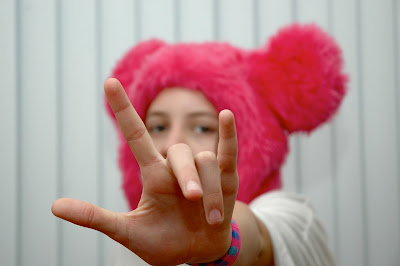In a larger sense, I guess perhaps it really is all about tools. In a sense, all the work that everyone associated with disability does becomes a tool. A tool, and a means to an end, that end being a sea change in how our society recognizes basic humanity. That end often feels too big, too much, too far away. It can be a disheartening feeling.
This was mostly the subject of my speech at Wooster. I didn't want to talk so much about specifics of Schuyler's experience with AAC, or what I'd learned as a parent, or to make myself sound like a swell dad or a fancy writer, or to make us all feel good about what we were doing. Schuyler's story is the story of every kid who ever needed help communicating to a larger world, and of every adult those kids become. Most of those in attendance knew Schuyler's story, whether or not they realized it. And I'm just a guy who wrote a book and was granted a platform in the world because I got lucky. I remain lucky, just a dumb dad who knows how to push words around in a way that people will listen to. What matters is what I do with it, I suppose.
I wanted people listening to my speech to understand that Schuyler's disability makes her life more challenging, but her difficulty mostly comes from trying to move through a world that hasn't made a place for her, or for those afflicted as she is, and certainly for those whose own communication is challenging in ways that go far beyond anything Schuyler has ever faced. I wanted people to think about communication, which I feel is the touchstone here, the piece that drives the rest. I wanted people to understand that communication requires that vast toolbox, full of possibilities that often don't even look like tools to our limited vision.
I wanted those who were listening to what I had to say to think about worth. I wanted them to think about what it means to be a human being, and whether or not love can truly exist where value hasn't been recognized and allowed to flourish.
I think the fight for equal rights (and a true shift in how we as a society value the disabled among us) must be expressed in the language of basic human rights. It can't be about entitlements, or how much is appropriate to do for kids with disabilities in school or the adults they become. It absolutely can't be about what we think we can afford.
It must be about what we CAN'T afford, and who we cannot allow ourselves to neglect if we want our humanity to thrive and not wither. It's not just about how we treat the afflicted among us. It's about what we are prepared to demand from ourselves. It's about what we wish to see when we look inward.
What I wanted to accomplish in my speech was big and difficult, and I'm small and flawed. But if I could reach anyone who heard what I was trying to say and recognized their own feelings that things can't remain like this, then it was a start. I would settle for reaching one person, if that person was committed to doing the hard work, the good work. And I believe I may have succeeded, which excites me and makes me hungry for more. Hungry for change, and for a transformation in what we as a society can recognize, within a breathtaking diversity of difference, as human and of real worth.
In my speech, I discussed Jean Vanier's belief that those with disabilities compel us to face two very difficult questions. "Do you consider me human? Do you love me?" In our journey to answer those questions, we reach a point of not just acceptance with those with disabilities but of real integration into the social narrative in a series of evolutionary steps. The first is fear, of the differences and of our own frailty. Next comes pity, which is only slightly better and certainly no more helpful. Most of us move on to a place where we respect persons with disabilities, and some of us move forward to a sincere desire to do the work required to help them.
But there's a final step that we as a society must make. The path to understanding the true humanity of the disabled is to enter into authentic relationships with them, and to reach a state of love through an unfettered grasp of their humanity in all its difference. That piece can be elusive, even to professionals. I'm truly grateful to programs like Best Buddies or the HOPE program at Schuyler's school that partners neurotypical kids with their special needs peers during lunch periods and school activities, but that's not the finish line. There is no finish line, but rather an evolution for us, one that leads to real relationships. Intimate friends, romantic partners, professional colleagues, bitter enemies, whatever. But connections that are real, and which aren't simply real in spite of the disabilities and the differences, but immersed in them. Human neurological and physical diversity as a driving engine of connection.
I quoted Vanier in my speech, but I could have quoted Paddy Chayefsky (through the voice of his character Howard Beale in the movie Network). "All I know is that first you've got to get mad. You've got to say, 'I'm a human being, God damn it! My life has value!'"
Either one works for me.

1 comment:
Lots to chew on. Thanks.
Post a Comment